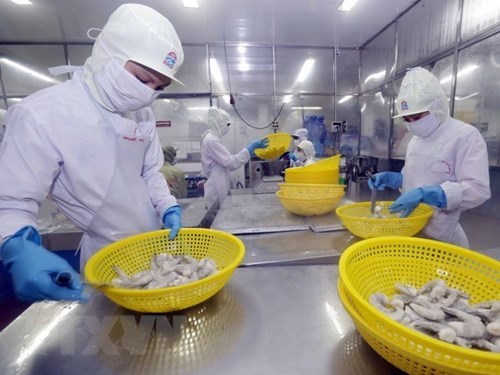According to the Vietnam Association of Seafood Exporters and Producers, constant decrease in export value in recent months brought the country’s total earnings from shrimp in the first eight months of the year to nearly USD 2.3 billion, down 3 percent year on year.
VASEP General Secretary Truong Dinh Hoe said that increasing trade barriers and safeguard measures in import markets to protect their own industry also posed formidable challenges for Vietnamese shrimp exports in the recent past.
    |
 |
|
Vietnamese shrimp processed for exports |
In recent months, the decreasing trend in price prompted shrimp farmers in major exporting countries such as India, Thailand and Vietnam to reduce production, which in turn helped the price to pick up. However, when the US dollar is rallying against other several currencies, importers had to cut purchasing price to compensate for exchange rate differences, leaving little room for shrimp price to recover, according to Tran Van Linh, Chairman of Thuan Phuoc Seafood and Trading Corporation.
Evaluating the world’s shrimp supply and demand, Director of An Loc Nguyen Co.,Ltd Pham Huu An said that global demand for shrimp will grow stably and sustainably in the coming year, which is estimated at 5.2 million tons by 2020, and 6.5 million tons by 2025.
According to An, Vietnam still has huge potential to bolster exports to the US and Japan. Currently, Vietnam’s shipments to those two countries are still modest while their demand is constantly rising. Vietnam’s shrimp accounted for just 10 percent of the US’s shrimp demand and 25 percent of Japan’s.
Regarding the EU market, in a bid to capitalize on the Generalized Scheme of Preferences (GSP), VASEP experts suggested the shrimp sector should increase the number of GAP farms and upgrade processing factories ensuring that they meet requirements of EU nations.
As shrimp consumption will grow in many countries on the occasion of the major holiday season at the end of the year, Vietnamese exporters must make meticulous preparations for the orders, and take strict control of food safety. This will help Vietnamese shrimp gain competitive edge, and increase prestige and brand in the context of abundant global supply.
Source: VNA